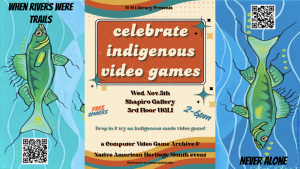
Play and learn from these video games to recognize Native American Heritage Month!
NEVER ALONE (Kisima Inŋitchuŋa in the Iñupiaq language) was created about a decade ago by the Cook Inlet Tribal Council, Inc., a tribal non-profit organization in Anchorage, Alaska. The community noticed that tribal elders’ knowledge was not being passed to youth as traditions and ways of life, from caribou hunting to the blanket toss, weren’t continued. The CITC were seeking a way to connect with their youth and engage them using the tools of modernity. Their chosen medium: video games.
WHEN RIVERS WERE TRAILS is a 2D adventure game in much the same style as Oregon Trails. In 2018 the Indian Land Tenure Foundation commissioned 20 Indigenous storytellers, as well as Native musicians and artist Elizabeth LaPensée, to create When Rivers Were Trails. This game, which is free for anyone to download, was created to educate Americans on the history of federal allotment policies. It was created by Native people for Native and non-Native people alike, and we hope you come join us in playing!
Each November our campus celebrates the histories, cultures and contributions of Indigenous Americans, and at U-M Library we offer access to a wide range of Indigenous-created works. Video games are accessible through our Computer and Video Game Archive.
NEVER ALONE (Kisima Inŋitchuŋa in the Iñupiaq language) was created about a decade ago by the Cook Inlet Tribal Council, Inc., a tribal non-profit organization in Anchorage, Alaska. The community noticed that tribal elders’ knowledge was not being passed to youth as traditions and ways of life, from caribou hunting to the blanket toss, weren’t continued. The CITC were seeking a way to connect with their youth and engage them using the tools of modernity. Their chosen medium: video games.
WHEN RIVERS WERE TRAILS is a 2D adventure game in much the same style as Oregon Trails. In 2018 the Indian Land Tenure Foundation commissioned 20 Indigenous storytellers, as well as Native musicians and artist Elizabeth LaPensée, to create When Rivers Were Trails. This game, which is free for anyone to download, was created to educate Americans on the history of federal allotment policies. It was created by Native people for Native and non-Native people alike, and we hope you come join us in playing!
Each November our campus celebrates the histories, cultures and contributions of Indigenous Americans, and at U-M Library we offer access to a wide range of Indigenous-created works. Video games are accessible through our Computer and Video Game Archive.